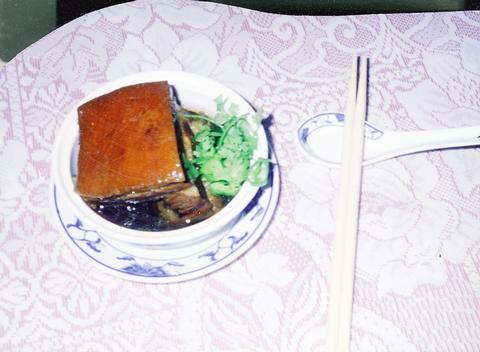The first two characters in the name of Chu Cha Dan Fan (初茶淡飯) mean a first taste of tea and are a play on a Chinese idiom that refers to a humble meal. The name cannot be more appropriate for this restaurant that serves rare "tea cuisine" in a cozy dining environment.
Neighboring a dozen coffee houses in an alley off Liaoning Street night market, this restaurant has a door hidden by leafy greenery and a quaint interior like a 1930s Shanghai teahouse. As soon as diners enter, they are deeply submerged in a retro atmosphere created by old Chinese pop songs and walls displaying antique Chinese posters of smiling calendar girls in traditional dress. The wooden Buddha carvings, the owner's collection of jade and the flowing calligraphy that fill every corner of the restaurant all add to the classically Oriental feel.

PHOTO: VICO LEE, TAIPEI TIMES
The restaurant's special tea cuisine is the innovation of owner and chef Hsieh Chang-chuo (謝長輈), who conceived of the restaurant after years of working as a chef in Chinese restaurants in Holland and Belgium.
"Traditionally, only a couple of Chinese dishes are made with tea. The way Westerners eat seafood with white wine and beef with red wine inspired me to cook meat with a variety of green or black tea," Hsieh said. The appeal of tea cuisine is its many benefits to health. "All kinds of meat are acidic. The alkali in tea can help neutralize this, making the dish more suitable for the human body," Hsieh added.
Hsieh's signature dish is dong po pork (東坡罈肉, NT$260), a favorite among foreign customers to the restaurant. Improving on the famous Chinese dish, Hsieh stews the fatty pork with pu-er tea (普洱茶), which helps cut the grease from the meat. People who would usually wince at the sight of fatty pork will be surprised by its light and non-greasy taste, so different from the artery-clogging, soy sauce-heavy fatty pork found in most other restaurants.
Chicken in tea (茶露雞, NT$260) is a twist on drunken chicken (醉雞), another traditional dish. By marinating the chicken in tieh kuanyin tea (鐵觀音茶), instead of wine, Hsieh creates a refreshing and beautiful dish with snow-colored meat and crystal skin.
Other tea-flavored dishes include chicken in black tea, bao chung shrimp(包種蝦仁) and pu-er beef, which uses vintage 12-year-old Yunnan tea.
The restaurant also provides Sichuan dishes such as kung pao chicken(宮保雞丁) and medicinal stews like Tian Shan hsueh lian chicken (天山雪蓮雞). The latter, using chicken legs boiled in ginseng and other traditional herbs, is only served in winter.
Although it opened only 10 months ago without much fanfare, the restaurant already has a loyal clientele who crowd the place during and long after meals.

Most heroes are remembered for the battles they fought. Taiwan’s Black Bat Squadron is remembered for flying into Chinese airspace 838 times between 1953 and 1967, and for the 148 men whose sacrifice bought the intelligence that kept Taiwan secure. Two-thirds of the squadron died carrying out missions most people wouldn’t learn about for another 40 years. The squadron lost 15 aircraft and 148 crew members over those 14 years, making it the deadliest unit in Taiwan’s military history by casualty rate. They flew at night, often at low altitudes, straight into some of the most heavily defended airspace in Asia.

Beijing’s ironic, abusive tantrums aimed at Japan since Japanese Prime Minister Sanae Takaichi publicly stated that a Taiwan contingency would be an existential crisis for Japan, have revealed for all the world to see that the People’s Republic of China (PRC) lusts after Okinawa. We all owe Takaichi a debt of thanks for getting the PRC to make that public. The PRC and its netizens, taking their cue from the Chinese Communist Party (CCP), are presenting Okinawa by mirroring the claims about Taiwan. Official PRC propaganda organs began to wax lyrical about Okinawa’s “unsettled status” beginning last month. A Global

Taiwan’s democracy is at risk. Be very alarmed. This is not a drill. The current constitutional crisis progressed slowly, then suddenly. Political tensions, partisan hostility and emotions are all running high right when cool heads and calm negotiation are most needed. Oxford defines brinkmanship as: “The art or practice of pursuing a dangerous policy to the limits of safety before stopping, especially in politics.” It says the term comes from a quote from a 1956 Cold War interview with then-American Secretary of State John Foster Dulles, when he said: ‘The ability to get to the verge without getting into the war is

Like much in the world today, theater has experienced major disruptions over the six years since COVID-19. The pandemic, the war in Ukraine and social media have created a new normal of geopolitical and information uncertainty, and the performing arts are not immune to these effects. “Ten years ago people wanted to come to the theater to engage with important issues, but now the Internet allows them to engage with those issues powerfully and immediately,” said Faith Tan, programming director of the Esplanade in Singapore, speaking last week in Japan. “One reaction to unpredictability has been a renewed emphasis on